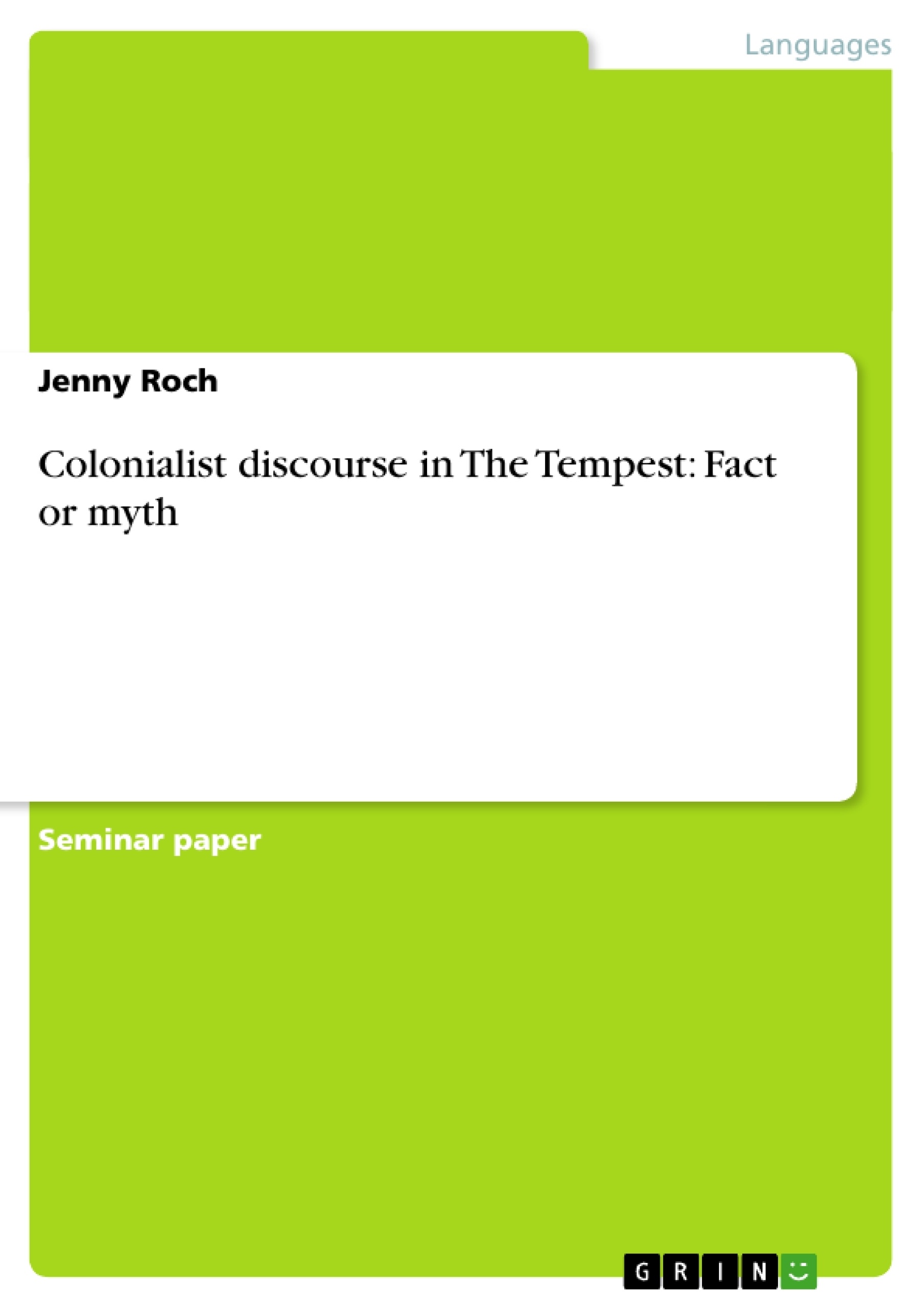Ever since its publication in 1609 (?), The Tempest has been a hugely appreciated play, most probably on account of its ability to satisfy everyone’s taste: music and dancing, action, suspense, comedy and love, The Tempest has got it all. But just as the play is enjoyable, it is also complicated, multilayered. Recent criticism of the play, especially since the 1950s, has focused on the colonial discourse supposedly underlying the play. Stephen Greenblatt for instance, on the sub ject of Caliban, argues that he ‘is anything but a Noble Savage’. For James Smith, he is ‘one of the most obviously nightmarish figures in the play’. I have in the past six months seen two productions of The Tempest, and never did it strike me as being a play infused with colonial discourse. Although Shakespeare’s interest in other cultures and exploring the ‘exotic’, the ‘other’ pervades the entire corpus of his work, one should be careful about freely associating this curiosity of the unknown with colonial discourse- whether deliberate or unintentional on Shakespeare’s part- or race-writing. ‘In discussion of value, Shakespeare is, of course, invariably treated as a special case, having come to serve as something like the gold standard of English Literature’. Although this is a contestable statement in itself, the aim of this essay is not to discuss the authority and reliability of Shakespeare as a playwright, but to question the views which label The Tempest as a colonial, post-colonial, proto - colonial play. There is no need to discuss the existence of othering in the play, as this would be stating the obvious. Rather, I would like to show that, although many incidents in the play may invite a reader to a colonial reading of the text, they can just as well be over- interpretations and fall victim to a subjugation of a discourse foreign to Shakespeare’s intentions.
Inhaltsverzeichnis (Table of Contents)
- Colonial Discourse in The Tempest: Fact or Myth?
- Anachronism and the Colonial Discourse
- Caliban: The ‘Other’ and the Problem of ‘True Beginnings’
- Caliban: The ‘Other’ and the Problem of Power Relations
Zielsetzung und Themenschwerpunkte (Objectives and Key Themes)
This essay aims to challenge the prevalent interpretation of Shakespeare's The Tempest as a colonial, post-colonial, or proto-colonial play. While acknowledging the presence of 'othering' in the play, the essay argues that many incidents often interpreted through a colonial lens may be over-interpretations and ultimately fail to reflect Shakespeare's true intentions.
- The problem of anachronism in applying colonial discourse to a text predating its emergence.
- The multifaceted nature of 'othering' in Shakespeare's work.
- The complexities of power relations and the concept of 'true beginnings' in the play.
- The potential for misinterpreting Caliban's character and motivations.
- The importance of considering the context and historical limitations of the text.
Zusammenfassung der Kapitel (Chapter Summaries)
- The essay begins by questioning the applicability of colonial discourse to The Tempest, considering the anachronism involved. It argues that while Shakespeare was interested in 'other' cultures, his approach differs from modern interpretations of race and colonialism.
- The character of Caliban is then examined as a key focal point for colonial interpretations. The essay analyzes Caliban's perspective on his arrival on the island and his relationship with Prospero, highlighting the discrepancies in their accounts and the potential for misinterpretations.
- The essay delves further into Caliban's character, exploring his motivations and his relationship with Prospero. It challenges the view of Caliban as a "rapacious other" and argues that his actions are driven by natural instincts and a need for direction.
Schlüsselwörter (Keywords)
The key focus of this essay is the analysis of colonial discourse in Shakespeare's The Tempest. This involves examining concepts such as anachronism, 'othering,' power relations, and the interpretation of characters like Caliban. The essay further explores the significance of context and historical limitations in understanding the play's themes and motivations.
Frequently Asked Questions
Is "The Tempest" a colonial play?
While recent criticism since the 1950s focuses on colonial discourse, this essay argues that such readings may be anachronistic over-interpretations.
How is Caliban viewed in colonial interpretations?
Caliban is often seen as the "other" or a "Noble Savage," representing the indigenous population subjected to Prospero's (the colonizer's) rule.
What is the problem with applying modern race-writing to Shakespeare?
The essay suggests that Shakespeare's curiosity about "exotic" cultures should not be freely equated with deliberate colonial discourse or modern concepts of race.
Does "othering" exist in The Tempest?
Yes, the essay acknowledges that "othering" is obvious in the play, but questions if this automatically implies a colonial political agenda.
What are "true beginnings" in the context of the play?
This refers to the conflicting accounts of who originally owned the island and how power relations were established between Caliban and Prospero.
- Arbeit zitieren
- Jenny Roch (Autor:in), 2005, Colonialist discourse in The Tempest: Fact or myth, München, GRIN Verlag, https://www.grin.com/document/38685



